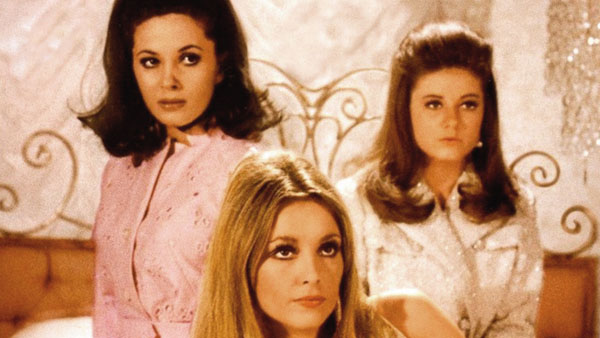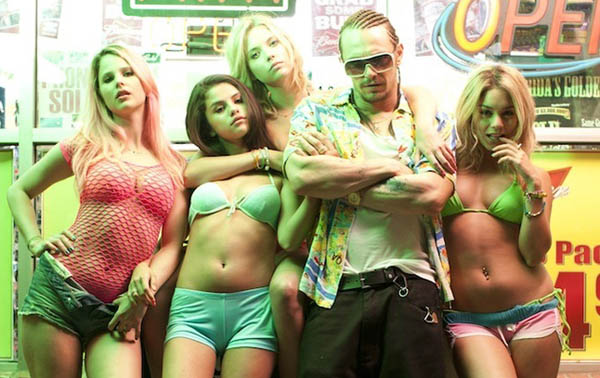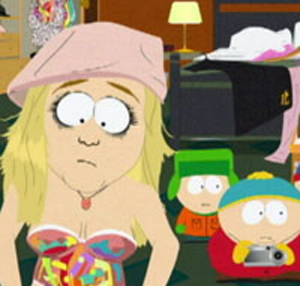I’ll admit that I giggled when Miley cut her hair and her twitter fan said she looked butch. I laughed when Britney went loco and shaved it all off. Hair seems to be the number one method of rebellion for the Disney starlets, this host of young women who grow up in front of the camera with overly white smiles and innocent girlish good-looks (often dimples), and then completely implode in the most public way possible. Yes, of course, these girls seek out stardom, and there will always be young kids who will do anything to get on TV or have their fame moment online, particularly now in this image-saturated techno age. And there will always be parents who will push their child from the moment they can walk to be a triple singing-dancing-acting threat. But what really intrigues/confuses me is this idea of the spectacle itself, the way in which there is an intense focus placed on these young women as they mature from kids to teenagers to young adults: it’s a coming-of-age that comes with a side of anti-depressants and multiple rehab trips – but it serves as global entertainment – whether it’s taking place on the Disney set, or through leaked grainy mobile bra pics and indiscretions at the Chateau Marmont.
What I find interesting is the way in which these girls become less subject, more object. Their constructed images on Disney shows, particularly those of Miley, Selena and Vanessa Hudgens, are deliberately blurred between fiction and reality. Miley playing Miley Stewart on Hannah Montana paralleled and reacted with her own ascent to stardom, it made the cracks all the more powerful when the cigarette and salvia-smoking Cyrus made the front page of People. And there so many of them, and most, not all, follow exactly the same pattern: a rapid acceleration of fame and success, followed by an equally rapid self-destructive downward spiral, often involving drugs, excessive sexual escapades, and very public mental breakdowns.
Eileen Myles wrote in Inferno ‘that there is a moment a women’s life when she discovers she can have sex with as many people as she wants.’ And I wonder if it is this moment that lies at the heart of the spectacle the audience finds so intoxicating, the moment of transition between innocent child-star and fully-fledged, often raging, sexual woman – Christina’s crotchless pants come to mind. And this moment, this point of knowledge is captured in so much detail, from going out sans underwear, to lesbian flirtations, and an endless succession of DUI’s and mugshots. Maybe it’s a need to see childish innocence so completely undone in a very pubic manner, an obsession with a hedonistic female youth that we all secretly desire to be or to have. Is it that much-discussed idea that we all desire to see the virgin (as so many of these girls avow their chastity upfront) suddenly and completely destroyed by their sexualisation and involvement in adult life? That it’s kind of hot when they’re virgins with midrifts but not when they actually start having sex. I’m not sure.
Maybe it’s just that the information is so easily available now – fb, twitter, tumblr, perezhilton – that we just expect and anticipate these images and these narratives – that they are now embedded in the culture. It’s a twist on the coming-of-age narrative that seems easy to get, expected, contained in three very nicely packaged acts (ascent-fall-redemption).
What I really want to untangle, and what I’m struggling to get, is the reason why there is this endless self-perpetuating cycle of young girls going from mega child-stardom, with usually a very public Christian message or avowal (thank you Disney) to hysteric and mental collapse, and then a kind of recuperation/reinvention through even more media outlets (see Lindsey and her posters for the new Lifetime series Dick and Liz). There is the endless level of interest, curiosity and desire for gossip-porn that sustains it. And I don’t think that it can be dismissed as tall poppy syndrome, or that it’s simply part of human nature to want to see these girls fall off their very high and wealthy pedestal.
It’s not that we relish the failure because there is so much interest in the third act: the reinventing and renewing of crashed out teen stars. The decision to take on both Britney and Demi Lovato as X Factor judges to compete with J. Lo’s impressive collection of bodysuits on Idol is a weird mix of wanting these two women, who’ve both had some pretty severe breakdowns, to come back with a vengeance, and the underlying possibility that hey, they just might go nuts again for us on camera. This was clear right from the outset with the number of leaks about Demi and Britney not getting on, temper tantrums and walk outs on set. Then there is the endless reflexive meta-aspect where former teen queens who had spectacular descents are mentoring other teens so that they too can take on the status of teen queen, encouraging other somewhat fragile kids that they too can be like them – all in front of a camera and, I assume, accompanied by a large supply of valium and sedatives. The mental breakdown has just become a continuation of the performance, of the media cycle. It’s the same with Spring Breakers and V. Hudg pouting in her bikini in exactly the same pose that a couple of years ago was found on her mobile phone.
I feel like these starlets suggest some pretty sinister undertones to the entertainment industry: there is more than a whiff of manipulation of unstable young adults by parents/executives/management, and there is an ever increasingly short cycle that means most of these girls are burnt out and screwed up by seventeen (Demi is 20 and now a ‘mentor’). But what I find most concerning is the obsession and influence of this three-act narrative arc. These narratives seep into broader cultural concerns, have much more far-reaching influence that just a half-hour sitcom aimed at tweens (12-14). I guess what I’m trying to get at is when we watch Britney or Demi or Lindsay and laugh or squirm, ridicule, or maybe a weird mixture of all three, we’re looking at an image that is a lot closer than it first appears. It’s like what DFW wrote in ‘Fictional Futures and Conspicuously Young’ (1988), which kind of pre-empts the current over-loaded and over-saturated information age: ‘television [and now Web 2.0] is something to be lived with, not just looked at…TV [and I’m going to suggest our young starlets] is as much a part of reality as Toyotas and gridlock. We quite literally cannot ‘imagine’ life without it.’
Tags: Britney Spears, demi lovato, disney, hair, mental breakdown, miley cyrus, starlets, television, Vanessa Hudgens







Young women having the occasional freak-out is neither new nor unique to the information age. I think celebrity ‘news’ tends to exaggerate the importance of the stories (no matter what their nature) so a starlet’s ‘mental breakdown’ might be nothing more than a non-celebrity’s ‘bad day.’
I cut my own hair the other day; it doesn’t look very good, but that doesn’t mean I’m being abused or losing my mind.
I really enjoyed this. The spectacle of these young women is really intoxicating and because of the information age, we have the kind of front row seat that is unprecedented.
next i’d like to see an article about long hair on pretty men
with photos
“Don’t tell Mom, but I ate all your bacon.”
The entertainment industry is a game, and some of the people mentioned here, who I know or knew in the past, forget that it’s a game. Selena hasn’t forgotten. She’s very savvy, very smart.
Fame, and especially high fame, is pure abstractive poison that invites every delusion, every professional and emotional disappointment. That said, fame too can be played well. At best, it is constantly bent by the famous, bent towards unsexy stuff.
These girls need people to stop giving a fuck as much as people need to stop expecting & buying into the (almost entirely manufactured) three act structure.
I get the hair thing. When you’re obligated contractually to keep your appearance as is, a haircut’s a quick fix to remind you that your identity isn’t fixed. I root for haircuts.